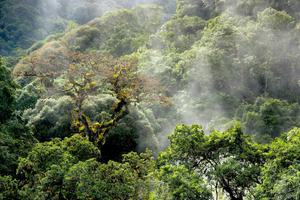The pronghorn, a close relative of the antelope, is the fastest mammal in North America and an iconic creature in the American West, where an estimated 700,000 roam the high desert and plains. In recent years, however, intensive development — including a natural gas drilling boom in Wyoming and Colorado — has begun to eat away at the pronghorn’s territory.
In a video report for Yale Environment 360, “End of the Range: Plight of the Pronghorn,” journalists Daniel Glick and Ted Wood, of The Story Group, examine the fate of one small herd of pronghorn that has migrated for more than 6,000 years from the Grand Teton Mountains in Wyoming to their wintering grounds. The several hundred pronghorn that still make the 160-mile round-trip migration now face an obstacle course of drilling pads, roads, fences, and new subdivisions.
The threats to this small band of pronghorn — part of the 46,000-strong Upper Green River Valley herd — prompted the U.S. Forest Service in 2008 to officially designate a section of the migration route as a federally protected migration corridor; scientists and conservationists now want that protection extended to the rest of the migration route. As Glick notes, “The West’s iconic landscapes and animals are paying a steep price for our energy addictions.”
video
Pronghorn Herd Faces Obstacles from Natural Gas Boom in Rocky Mountain West
The pronghorn, a close relative of the antelope, is the fastest mammal in North America and an iconic creature in the American West, where an estimated 700,000 roam the high desert and plains. In recent years, however, intensive development has begun to eat away at the pronghorn’s territory. In a video report for Yale Environment 360, journalists Daniel Glick and Ted Wood examine the fate of a herd of pronghorn that has migrated for more than 6,000 years from the Grand Teton Mountains to their wintering grounds.
More From E360
-
MINING
In Myanmar, Illicit Rare Earth Mining Is Taking a Heavy Toll
-
INTERVIEW
How Batteries, Not Natural Gas, Can Power the Data Center Boom
-
ANALYSIS
As U.S. and E.U. Retreat on Climate, China Takes the Leadership Role
-
Solutions
From Ruins to Reuse: How Ukrainians Are Repurposing War Waste
-
ANALYSIS
Carbon Offsets Are Failing. Can a New Plan Save the Rainforests?
-
Energy
Facing a Hostile Administration, U.S. Offshore Wind Is in Retreat
-
Biodiversity
As Jaguars Recover, Will the Border Wall Block Their U.S. Return?
-
WATER
An E.U. Plan to Slash Micropollutants in Wastewater Is Under Attack
-
INTERVIEW
This Data Scientist Sees Progress in the Climate Change Fight
-
Climate
As Floods Worsen, Pakistan Is the Epicenter of Climate Change
-
Climate
Heat Stress Is a Major Driver of India’s Kidney Disease Epidemic
-
Energy
It’s a ‘Golden Age’ for U.S. LNG Industry, But Climate Risks Loom


